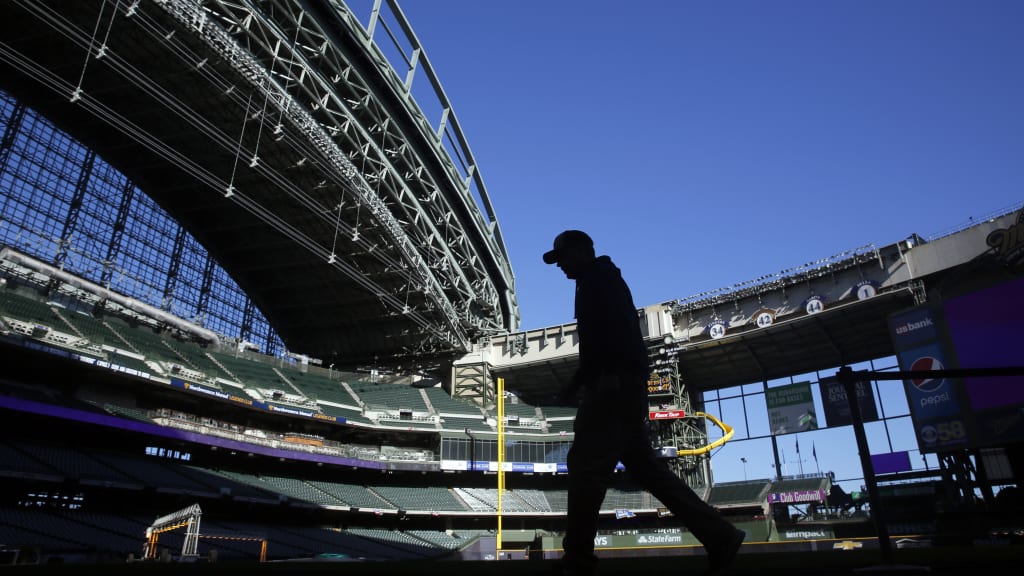
MILWAUKEE -- Brewers principal owner Mark Attanasio expressed optimism Tuesday about the prospect of Major League Baseball resuming play this year.
“We’re at the precipice of what we need to do to play baseball in the summer of 2020,” he said. “I think we’re going to.”
Attanasio, who sits on MLB’s executive council and the league’s labor committee, spoke during a webinar hosted by the Greater Milwaukee Committee, representing his first public comments since MLB paused Spring Training in mid-March due to the coronavirus pandemic. Brewers president of baseball operations David Stearns and manager Craig Counsell also took part, discussing the challenges facing the sport and the team as they try to get back on the field.
“This will be the ultimate collaborative effort,” said Attanasio, “and we’ve got just the organization and community to undertake and succeed at that. ... The short answer is [an agreement] has to come together very quickly or we'll run out of time.”
Here is more of what the men had to say:
Attanasio on health safety measures:
“I just want to emphasize, first and foremost -- I spoke to [Wisconsin] Gov. [Tony] Evers and to [Milwaukee] Mayor [Tom] Barrett about this -- if we're going to play games, it's important to stage those games safely. To do that, we're going to have to be collaborative with local leaders -- not only politicians, but also healthcare professionals. ... It's intensely local but we're all going to work together. And we need to work with [local businesses] as well because we need to get back, not just for the dollars and cents of getting back, but to get back to the way of life that we all love. Everyone loves going to Brewers games in the summer so we have to figure out how to do that safely.
“I've also put on my list of responsibilities how to get Bob Uecker into the ballpark. He wants to announce games whether it's safe for him or not. [Brewers executives] Tyler Barnes and Rick Schlesinger are going to make sure it’s safe for him to get into the ballpark and broadcast when we do [return]. We're going to have to work with the whole group and with all of our colleagues. We talk about safety for the players but when we finally play in front of fans, we need to keep them safe. We need to keep our employees safe. It's an enormous collaborative effort.”
Attanasio on a potential Spring Training 2.0:
“My strong preference is to play Spring Training in Miller Park, in Wisconsin. Bring the boys back in town. I think it will be a real boost for everyone but in order to do that, we've got to get through the medical protocols. We have to get the doctors, the commissioner of health, the mayor, the governor and everyone else to feel safe. I feel we can make Miller Park as safe as we can make American Family Fields of Phoenix so I'd like to try to do that if we can.”
Stearns on the baseball operations challenges:
“If we are going to get players back on the field, if we are going to restart a season -- and I’m very optimistic that we can -- we have to ensure that we can keep everyone safe and that we can provide the appropriate protocols to do so. There are a couple of different ways we can go about doing this. As Mark mentioned, they’re outlined in a 68-page document that at this point we’ve all read through in baseball circles with a fine-toothed comb and picked it apart and offered feedback to the Commissioner’s Office, but there are a couple of different aspects of that.
“The first is an extraordinarily robust testing apparatus. Everyone associated with Major League players -- not just Major League players but everyone associated with them -- gets tested multiple times a week, at least multiple times a week. Many people will be tested almost daily.
“Beyond the testing, there are a certain set of guidelines that operators and teams have to follow in order to create safe working environments for our players and coaches and staff, and so we have to follow in a clubhouse setting all of the same social distancing guidelines, all of the same good hygiene practices that a normal business is going to have to follow in order to safely open up. It means reconfiguring a lot of our clubhouse spaces, providing extra space for our players to go through their normal routines. It means encouraging our players to spend more time outside; as we learn more about this virus, we learn being inside in particular in a crowded group probably isn’t particularly advisable. The more time you can spend outside if you’re with other people or in some proximity to other people, you probably reduce your risk a little bit. We have detailed guidelines such that Craig now has an assigned seat in the dugout. I don’t know if Craig is going to love that too much, but we have social distancing protocols in our dugout to make sure our coaches and players do not get too close to each other. We have guidelines for our coaches on the field, how close they can get to players, and of course we have very standard and stringent [personal protective equipment] guidelines so that anyone who’s in a clubhouse coming into contact with other people is fully equipped with the appropriate PPE. We believe we will be able to accomplish that.”
Counsell on staying in touch with players:
"This uncertainty has certainly been unique for them. I’ve found as we’ve gone on in this process as I talk to players, what they really want is a date. They want guidance that up to this point, we haven’t really been able to offer. They want a schedule, and there’s not one. Baseball players -- I think most of us, really -- crave some sort of routine. This has definitely upset that routine. I do feel like we have put special emphasis on keeping our pitchers prepared. I’m keeping closer tabs with those guys, understanding their schedules, knowing that they are the ones who are going to be significantly challenged in this new environment because of the schedule."
Counsell on what challenges he anticipates:
“We’re hoping we can get to an 80-, 81-game schedule. That’s half of the games that we normally play, but it’s still 81 games. I think some clubs, they may try to make it a sprint. It can’t be a sprint. I think it’s still 81 games; that’s a full NBA season. It’s significant. And if we are going to ramp players up very quickly ... keeping players healthy in a shortened season may be more challenging than ever, and may be more important than ever -- in various ways. It’s going to be important that we’re prudent with how much usage our players can have early in the season.”
Counsell on the potential of playing in empty stadiums:
“We need to focus really on let’s get some short-term answers to put a good product on the field in a very challenging environment and very different environment. I’m fascinated by not having fans in the stands and how that affects how we all do our job. It’s going to be a fascinating part of this. The players will dearly miss fans in the stands. They will dearly miss them, and it’s going to be impactful in how our season operates. It’s probably the question I’ve been considering the most, more than the rule changes, just the environment that we’re going to play. It’s one that’s very unique and one that some players haven’t felt in a long, long time. ... I was having a conversation with a friend, and I wonder if it will change players a little bit and their personalities. Instead of a live entertainment event as Mark said, it’s become like we’re on a movie set or we’re on a TV set, right? Actors in a TV production. I do think it could change, I do think you’re going to see different personalities from players a little bit at times. I think that’s an interesting part of the product for the TV viewer. I know the games will be different. I’m fascinated by how the TV viewing experience will be. I think it will be really interesting.”
Attanasio on baseball’s role in troubling times:
“Baseball has played a healing role in this country forever. It's one of the reasons it's the national pastime. Whether it's in the aftermath of wars or terrorist events, now in the aftermath of a pandemic, we have an opportunity to be the first sport to get out and play and to help repair the damage that's been done. I think we're all mindful that 40 million jobs have been lost. It's an astonishing number, one that's larger than the Great Depression. We all have a responsibility to give back to the folks in the country who have supported this industry so richly all these years and made it a fabric of America.
“... The outpouring of effort, cooperation, the way everybody has shared the pain in our organization to try to get us through this, it really makes me extremely proud to be a part of this. It really motivates me to be as tireless as I can be to try to get baseball back -- and back this summer to Wisconsin. I want to thank everyone in our organization at the Milwaukee Brewers who pulled together and got us to this point. We’re at the precipice of what we need to do to play baseball in the summer of 2020. I think we’re going to.”
